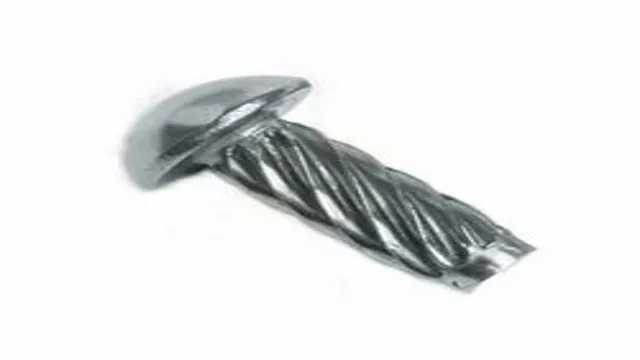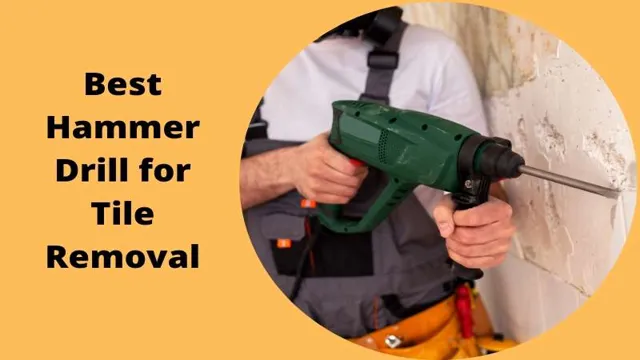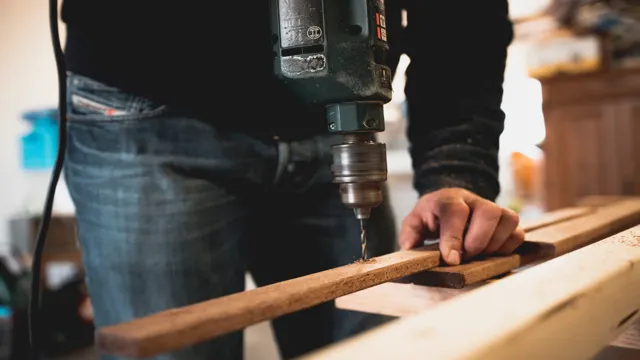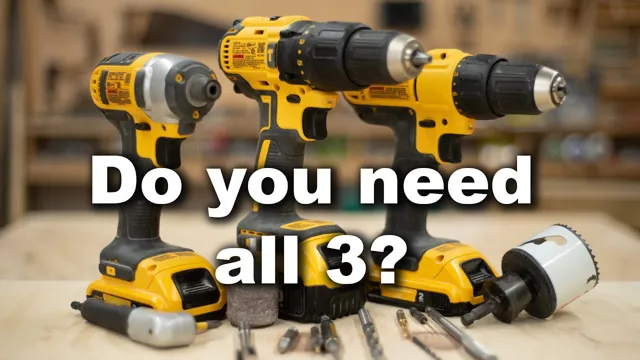Can I Use Hammer Drill Bits in Normal Drill? Expert Guide and Tips!
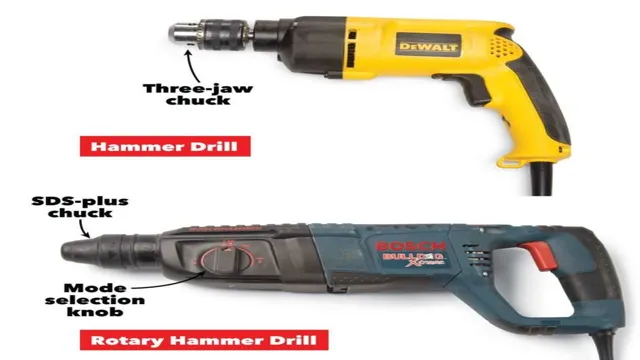
Have you ever found yourself in the middle of a DIY project, ready to drill a hole, but you don’t have a hammer drill? Maybe you have a regular drill and a set of hammer drill bits lying around, but you don’t know if they can be used interchangeably. Fear not! With a little bit of knowledge and some precautions, you can use hammer drill bits in normal drills. Keep reading to discover how to make the most of your tool set and get the job done faster and with greater precision.
Understanding the Differences
Can I use hammer drill bits in a normal drill? This is a common question that many people ask when looking for tools to complete a DIY project. The answer is yes, you can use hammer drill bits in a normal drill, but there are some key differences to keep in mind. Hammer drill bits are designed to withstand the force of a hammer drill, which delivers a rapid series of blows to the bit.
A normal drill simply rotates the bit, which means that using hammer drill bits in a normal drill may cause them to wear out more quickly. Additionally, hammer drill bits tend to be larger and heavier than bits designed for normal drills, which can make them difficult to handle and control. If you do decide to use hammer drill bits in a normal drill, be sure to use the appropriate size and take care when using them.
Overall, it is best to use the right tool for the job, so consider investing in a hammer drill if you plan on using hammer drill bits frequently.
Hammer Drill Bits vs Normal Drill Bits
Hammer drill bits and normal drill bits may look similar, but they are designed for different purposes. Hammer drill bits are specifically made to drill into tough surfaces like concrete and brick, while normal drill bits are best suited for drilling into wood and metal. The biggest difference between hammer drill bits and normal drill bits is the way they are constructed.
Hammer drill bits have special ridges on the sides, allowing them to grip onto the surface and create a smoother hole. They also have a stronger tip that can handle the constant hammering motion. Normal drill bits, on the other hand, have a sharp pointy tip and smooth sides for drilling quickly and efficiently into wood and metal.
It’s important to use the right type of drill bit for the surface you are drilling into, as using the wrong one can lead to damage or injury. So, if you’re planning on tackling tough surfaces like concrete or brick, make sure you invest in a set of hammer drill bits.
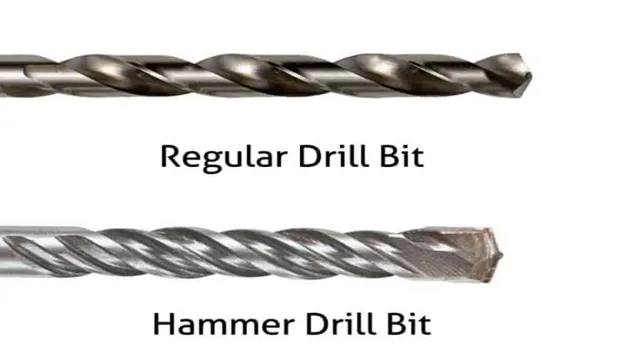
Impact and Rotation
When it comes to sports, impact and rotation are two commonly used terms that are often misunderstood. Impact refers to the force that an object experiences when it collides with another object, while rotation is the act of spinning or turning around a central point. In sports like basketball and football, impact is a key component of the game, while rotation is more important in sports like gymnastics and figure skating.
Understanding the differences between these two terms is crucial for athletes who want to improve their performance. By focusing on impact, basketball players can increase their rebounding skills and improve their defensive play, while gymnasts can use rotation to perform more complex maneuvers and improve their balance. Whether you’re a professional athlete or just a casual sports enthusiast, understanding the nuances of impact and rotation is important if you want to excel in your chosen sport.
Material Compatibility
When it comes to materials used in products, it’s essential to understand that not all materials are compatible with each other. Different materials have unique properties and characteristics that can affect how they interact with each other. For example, if you have a metal part that needs to be connected to a plastic component, you must ensure that the materials are compatible.
Metals and plastics have different thermal expansion rates, so the wrong combination of materials can cause stress and lead to breakage. Similarly, different chemicals used in manufacturing can react with each other, causing corrosion. It’s crucial to understand which materials are compatible to ensure the longevity and success of your product.
By doing so, you can select the right materials that will work together seamlessly, ensuring your product functions as intended.
Using Hammer Drill Bits in Normal Drills
If you’re wondering whether you can use hammer drill bits in your normal drill, the answer is yes, you can. However, it’s important to note that hammer drill bits have a different design than regular bits. They’re designed to withstand the force generated by a hammer drill, which means they’re more durable and can drill into harder materials like concrete or masonry.
Using a hammer drill bit in a regular drill can be useful if you need to drill into tougher materials, but keep in mind that the drill may not have the power to handle the force needed for heavy-duty drilling. It’s also important to choose the right size bit for your drill. Hammer drill bits come in different sizes and shank types, so make sure you select the right size and type for your drill.
In summary, hammer drill bits can be used in normal drills, but it’s important to select the right size and type for your drill and understand the limitations of using a regular drill for heavy-duty drilling tasks. So, go ahead and use that hammer drill bit in your regular drill, but remember to use caution and take appropriate safety precautions.
Possible Risks
Using hammer drill bits in normal drills can pose various risks to the user and the equipment. Hammer drill bits are designed to work with rotary hammer drills that can apply a significant amount of force to the bit, making them unsuitable for use in regular drills. Regular drills lack the power and speed necessary to operate hammer drill bits, which can result in excessive heat buildup, causing the bit to bend or break.
Using these bits can also cause damage to the drill’s motor and gears, as they are not designed to withstand the high impact forces of a hammer drill bit. Additionally, there is a high risk of injury to the user if the bit gets stuck in the drilling material, as the drill may suddenly jerk and twist in the user’s hand, causing them to lose control. Therefore, it’s essential to use the appropriate bit for the intended application to ensure safety and prolong the equipment’s lifespan.
Best Practices
Hammer Drill Bits in Normal Drills If you are looking to use hammer drill bits in your normal drill, there are some things to consider. First, it’s essential to ensure that the drill bit is compatible with the drill you are using. Some drill machines may not handle the hammer drill bits’ power, which can lead to damaged machines and ineffective drilling.
Additionally, it’s important to note that hammer drill bits are specifically designed for drilling through thick and tough materials, such as concrete and masonry. Using them on softer materials, like wood or plastic, can cause them to become dull and ineffective quickly. It’s also crucial to use the right drilling technique when using hammer drill bits in a normal drill.
Ensure that you are applying consistent pressure and allowing the drill bit to rotate evenly to avoid any overheating or breakage. Remember, while it’s possible to use hammer drill bits in normal drills, it’s important to take the proper precautions to ensure safe and effective drilling.
Conclusion
In conclusion, asking if you can use hammer drill bits in a normal drill is like asking if you can wear stilettos to go hiking – technically possible, but not advisable. Hammer drill bits are designed to withstand the powerful force of a hammer drill, and using them in a normal drill may result in damage to the drill and the bit itself. Stick to using the right tool for the job to avoid a potential tool-tastrophy!”
FAQs
What is the difference between a hammer drill bit and a normal drill bit?
A hammer drill bit is designed to drill into harder materials like concrete and masonry, while a normal drill bit is intended for use on softer materials like wood and metal.
Can I use a hammer drill bit on a regular drill?
While it is possible to use a hammer drill bit on a regular drill, you may not achieve the best results. Hammer drill bits require a lot of power to operate, and a normal drill may not have enough torque to drill into harder materials.
Do I need a special drill to use hammer drill bits?
While a hammer drill is the best tool for using hammer drill bits, some regular drills have a setting that allows them to operate like a hammer drill. Check your drill’s manual to see if it has this feature.
What materials can I drill into with a hammer drill bit?
Hammer drill bits are designed to drill into harder materials like concrete, brick, and stone. They can also be used on softer materials like wood and metal.
Can I use a normal drill bit on concrete or masonry?
While it is possible to use a normal drill bit on concrete or masonry, the results may not be satisfactory. Normal drill bits are not designed to handle the force required to drill into these harder materials.
Are there different types of hammer drill bits for different materials?
Yes, there are different types of hammer drill bits designed for different materials. For example, there are hammer drill bits specifically designed for drilling into granite, as well as bits for drilling into concrete and brick.
How long will a hammer drill bit last?
The lifespan of a hammer drill bit will depend on how often it is used and the materials it is drilling into. However, with proper use and maintenance, a good quality hammer drill bit can last for many years.

